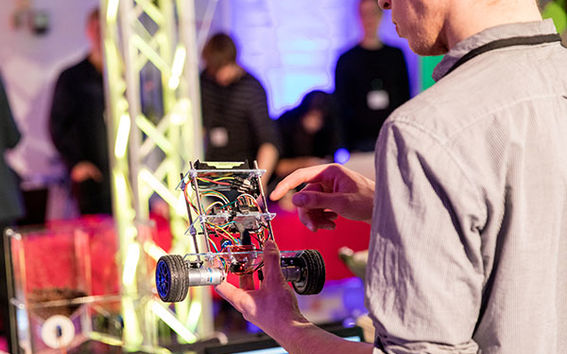Research projects at the Aalto Industrial Internet Campus

Anti-Trash
The AntiTrash project is developing an automatic trash and damage detection system for public transport and shared vehicles. It is important to create a pleasant surrounding for collective transport journeys. AntiTrash has tested machine-vision based trash detection, smart materials to increase the durability of the interior, reducing cleaning and component replacement costs and nanotechnology to detect smells and particles for superior indoor air quality. The Aalto University led project is done in cooperation with partners from the EIT Urban Mobility. Contact: Professor Kari Tammi
Digital Disruption of Industry (DDI)
Digital Disruption of Industry (DDI) -project studies the impacts of digitalization to the Finnish society through the lens of the industry. This six year project (2015-2020) is funded by the Strategic Research Council at the Academy of Finland. SRC provides funding to long-term and programme-based research aimed at finding solutions to the major challenges facing Finnish society.
AIIC is a partner at EIT Manufacturing
Factory of the Future
The project is transforming Finland’s manufacturing industry into an agile high-tech network of providers of various manufacturing services and integrators of production activities. Contact: Professor Valeriy Vyatkin, Aalto University
Finnish Industry New Age 3D
The project aims to enhance the capabilities of the Finnish foundry and manufacturing industries to use digital technologies like industrial internet and 3D printing. Contact Roy Björkstrand, Aalto University
TwinRotor
In TwinRotor, we will improve the behaviour of rotating machinery using a digital twin coupled with Industrial Internet methods to support enhanced data flow between the machinery, simulation based virtual sensors, and applied big data analytics. This will lead to insights into the improvement of the rotating machinery design, and to better operational efficiency of the machinery and to an enhanced quality of the products manufactured with the machinery. The wider scientific objective is to study how Industrial Internet methodologies can be applied especially to complex engineering design. Contact: Professor Petri Kuosmanen, Aalto University
SmartCom
SmartCom will develop and establish the basis for an unambiguous, universal, safe and uniform communication of metrological data in the Internet of Things (IoT) and Industry 4.0. Two European research projects as part of the European Metrology Programme for Innovation and Research (EMPIR) with a total EU funding of 3.6 M€ will develop a formal framework for the transmission of metrology data on the basis of the SI and a coherent metrology infrastructure for reliable evaluation and communication of quantitative data and its quality in IoT networks worldwide. The 3 year (May 2018 - June 2021) projects are
- SmartCom – with its central mission to establish a secure, unambiguous and unified exchange of data in all communication networks where metrological data is used. The principal investigator of SmartCom at Aalto University is professor Petri Kuosmanen.
- Met4FoF – aiming at the development of a metrological framework for the evaluation of measurement uncertainties for the complete lifecycle of measured data in industrial IoT networks.
Building and construction
Direct Digital Construction
Direct Digital Construction is a concept to continuously improve operations in the construction industry by capturing opportunities from emerging technologies. The construction work is done directly from the design model without setup, tooling or interpretation. Contact: Assistant Professor Antti Peltokorpi
Industrial Internet in Smart Buildings
The project builds integrated IoT solutions that smoothly share data between different systems used in buildings. At an office, this could mean accessing information about vacant conference rooms or the length of the queue at the cafeteria as well as being able to adjust the temperature and lighting at your desk with extreme ease. Contact: Professor Heikki Ihasalo
IoT to optimize buildings energy usage (REINO)
The project develops intelligent control of energy use in residential and office buildings together with Finnish companies. Buildings consume about 40% of total global energy consumption. Achieving 10% saving would already on European scale mean a market of 27 billion € annually. Increasing variable renewable electricity production poses growing requirements for the flexibility of the rest of the energy system. This project develops intelligent demand management of the energy system, together with Finnish companies aiming at growth. The steering algorithms developed in this project will be adjustable to different situations and different flexibility targets. The steering algorithms can also allow a temporary deterioration of the room space conditions (heating, air conditioning, cooling, etc), where the limits are specified by the user. Correspondingly, the user would achieve savings in energy costs. The project develops these steering devices and algorithms and demonstrates them in real buildings, estimates the cost savings achieved and helps the companies to grow international. The companies participating in REINO are: Finnish Energy, Fidelix, Fourdeg, Granlund, Residentia, Solixi and SRV. In addition, Aalto University Campus & Real Estate participates in the project. The main funding comes from Tekes as part of their Challenge Finland funding instrument. The project connects Aalto University’s research in the areas of energy and industrial Internet. Contact: Professor Sanna Syri, Aalto University
RealGo
The project develops new approaches for building and construction business that enhance the use of digital solutions. Pilot cases include indoor air tailored to user preferences through Aalto Space app and new business concepts for smart building services. Contact: Antti Säynäjoki
RealityCapture
In the Reality Capture project the research focus is on automatic monitoring of a construction project using laser scanning and photo-grammetria. Contact: Professor Olli Seppänen






